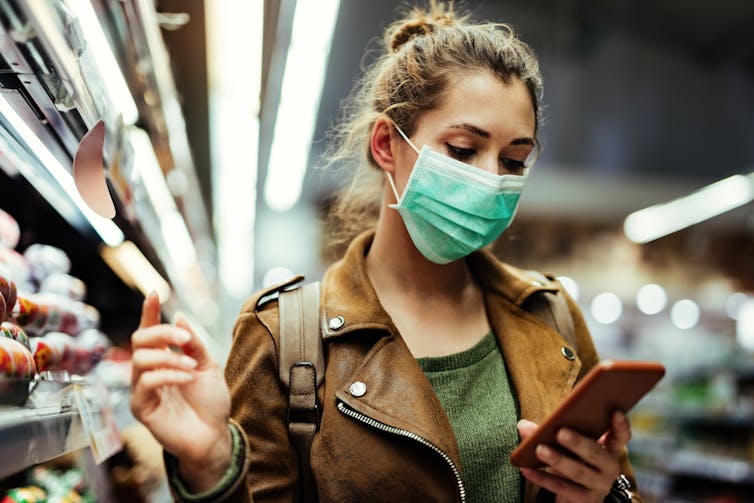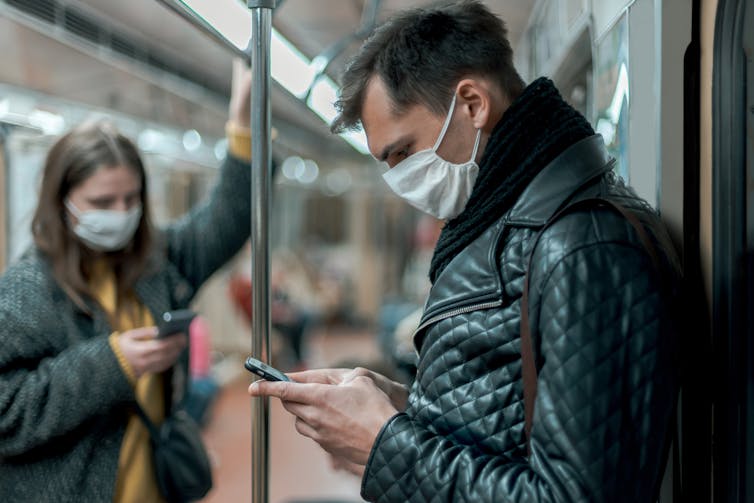Over 18 and considering the AstraZeneca vaccine? This may help you decide
- Written by Natasha Yates, Assistant Professor, General Practice, Bond University
If you are 18 or older, and in an area where there is a COVID-19 outbreak, the best vaccine for you is the one you can get right now[1]. That possibly means you should get the AstraZeneca vaccine, as Pfizer is still in short supply.
This updated advice was given by ATAGI (the Australian Technical Advisory Group on Immunisation), the government’s expert vaccine advisory body, on July 24. Why would it change to recommending either AstraZeneca or Pfizer, after months of preferring Pfizer for younger people?
More young people[2] are being hospitalised, in ICU and dying during this current outbreak in Australia, where the Delta strain is dominating.
Whether this is a function of the Delta strain being more dangerous to young people, or because older people are (as a group) more likely to be protected by already being vaccinated, remains a subject of debate[3].
Read more: Why is Delta such a worry? It's more infectious, probably causes more severe disease, and challenges our vaccines[4]
There is little argument, however, that the Delta strain is more infectious[5], which is why we want to vaccinate our population as quickly as possible[6].
So if you are 18 or older and have not been vaccinated yet, you may be asking whether getting an AstraZeneca vaccine right now is the right thing for you to do. To answer this we need to consider the benefits and risks of the AstraZeneca vaccination.
What do vaccines achieve?
When thinking about what any COVID-19 vaccine should achieve, there is an order of priority.
First, it should stop people who catch COVID-19 from dying[7].
Second, it should reduce risk of severe disease (symptoms bad enough to need ICU treatment).
Third, hospitalisations should go down.
 Vaccines need to protect people from death and severe disease.
Shutterstock[8]
Vaccines need to protect people from death and severe disease.
Shutterstock[8]
If a vaccine is doing more than these three things, it is a bonus.
We are very lucky the AstraZeneca and Pfizer vaccines not only achieve all three, they also decrease numbers of people suffering illness of any sort (including mild symptoms), and possibly even reduce transmission[9] (making people who have caught COVID-19 less infective).
Do vaccines work against the Delta variant?
Since Delta became the dominant strain of COVID-19 worldwide[10], researchers have been working hard to see how well current vaccines perform against it.
So far, the news is good. Let’s look at the evidence.
In the United Kingdom[11] where the Delta strain is the cause of the majority of infections at the moment[12], there were 229,218 COVID infections between February and July. Of these, 12.5% were in fully vaccinated people. These are known as “breakthrough infections” (because they “broke through” the protection of the vaccine).
Of those breakthrough infections, 3.8%, required a visit to ED. Just 2.9% required hospital admission, and less than 1% died.
This means even though the vaccines didn’t fully protect people against disease, they did achieve their primary purpose: to save lives and keep people out of hospital.
Read more: Most COVID deaths in England now are in the vaccinated – here's why that shouldn't alarm you[13]
Another study in the UK that narrowed down to look at just hospitalisation with Delta strain concludes AstraZeneca is 92% effective[14] against hospitalisation, after two doses.
Other studies have shown a 60%[15] to 67%[16] reduction in symptomatic disease.
Although AstraZeneca works to reduce infectivity of the Delta strain, vaccinated people can still transmit it to others[17].
That’s why it’s so important for vaccinated people to still observe all the other evidence-based ways of reducing spread including wearing masks, social distancing, and lockdown restrictions – at least until we have enough people in the community vaccinated[18].
Read more: When will we reach herd immunity? Here are 3 reasons that's a hard question to answer[19]
But what are the down sides?
Of course there are potential risks[20] from the AstraZeneca vaccine: injection site pain, tiredness, headache, muscle pain, fever and chills are the most commonly reported side effects.
Most of these are mild and temporary, going away within one to two days.
 Most symptoms are mild and resolve quickly.
Shutterstock[21]
Most symptoms are mild and resolve quickly.
Shutterstock[21]
There are also rare but severe side effects: anaphylaxis[22] (two to five per million people), and thrombosis with thrombocytopenia (TTS) – known colloquially as “clots”. The only risk factor that has been shown to predict how likely you are to get TTS after an AstraZeneca vaccine is age[23].
TTS clots are very different from other blood clots you may hear about. In the same way that having a basal cell cancer removed from your skin does not make you more at risk of getting a brain tumour, having a blood clot in your medical history (or family history) does not make you more at risk of TTS.
In addition, we have effective treatments[24] for TTS now, so the death rate is low.
To keep it in perspective, your risk of getting a blood clot[25] from TTS is still far less than your risk of dying in a car accident in the next year[26], and most people still don’t think twice about getting into a car.
Read more: How rare are blood clots after the AstraZeneca vaccine? What should you look out for? And how are they treated?[27]
Obviously, if there is no COVID-19 in the community then the risk from the vaccine will outweigh the risk from the disease – even a tiny risk is bigger than zero.
The reason ATAGI changed its advice to recommend the AstraZeneca vaccine to younger age groups in areas of outbreak is because as soon as COVID-19 starts to spread in the community, the risk of serious disease and death skyrockets. Which makes the vaccine suddenly become a very sensible option in Sydney[28] and other high-risk areas.
How can you get it?
If and when you decide to have the AstraZeneca vaccine and you live in NSW, you can simply book in with any place that is giving it in your area. This may be a GP or state vaccination clinic.
You are not required to see a GP first[29], but of course you should only book once you’ve had your questions answered and are ready to go ahead with it.
Apart from contacting local providers directly, you can register for vaccination via the eligibility checker here[30] (you fill in your details after completing the checker).
Pharmacies will not be administering AstraZeneca vaccines[31] to people under 40 at this stage.
 You can register for a vaccination online.
Shutterstock[32]
You can register for a vaccination online.
Shutterstock[32]
Finally, I have had in my practice many young people express frustration at being unable to get a vaccine before now, because they see it as a vital step forward for our community and the world.
Their lives have often been hugely disrupted by COVID-19 and they believe the risk of any vaccine is better than continuing with the status quo.
As one patient told me: “I’m young, I live a risky life. Getting this vaccine is the safest thing I have done all week.”
References
- ^ one you can get right now (www.health.gov.au)
- ^ More young people (www.health.gov.au)
- ^ subject of debate (www.theguardian.com)
- ^ Why is Delta such a worry? It's more infectious, probably causes more severe disease, and challenges our vaccines (theconversation.com)
- ^ more infectious (virological.org)
- ^ as quickly as possible (www.bmj.com)
- ^ dying (www.abc.net.au)
- ^ Shutterstock (www.shutterstock.com)
- ^ reduce transmission (www.gavi.org)
- ^ worldwide (www.ecdc.europa.eu)
- ^ United Kingdom (assets.publishing.service.gov.uk)
- ^ the majority of infections at the moment (www.bbc.com)
- ^ Most COVID deaths in England now are in the vaccinated – here's why that shouldn't alarm you (theconversation.com)
- ^ 92% effective (media.tghn.org)
- ^ 60% (www.thelancet.com)
- ^ 67% (www.nejm.org)
- ^ still transmit it to others (khub.net)
- ^ enough people in the community vaccinated (www.abc.net.au)
- ^ When will we reach herd immunity? Here are 3 reasons that's a hard question to answer (theconversation.com)
- ^ potential risks (www.health.gov.au)
- ^ Shutterstock (www.shutterstock.com)
- ^ anaphylaxis (www.cdc.gov)
- ^ age (www.health.gov.au)
- ^ have effective treatments (www.healthdirect.gov.au)
- ^ risk of getting a blood clot (www.health.gov.au)
- ^ in the next year (www.bitre.gov.au)
- ^ How rare are blood clots after the AstraZeneca vaccine? What should you look out for? And how are they treated? (theconversation.com)
- ^ Sydney (www.health.gov.au)
- ^ not required to see a GP first (www.smh.com.au)
- ^ here (covid-vaccine.healthdirect.gov.au)
- ^ not be administering AstraZeneca vaccines (www.health.nsw.gov.au)
- ^ Shutterstock (www.shutterstock.com)

















